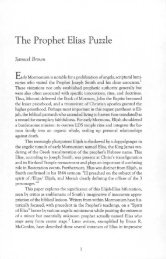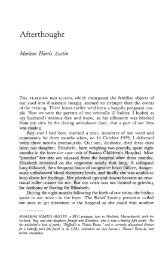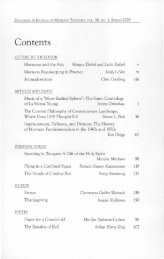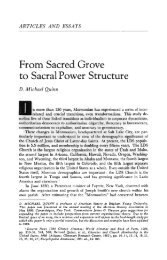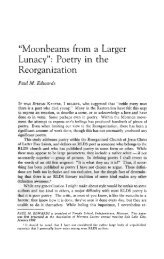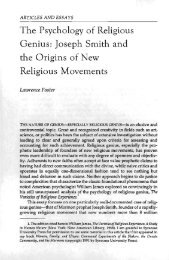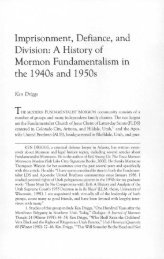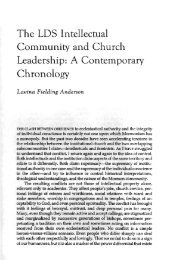Dialogue, Volume 25, Number 2 - Dialogue – A Journal of Mormon ...
Dialogue, Volume 25, Number 2 - Dialogue – A Journal of Mormon ...
Dialogue, Volume 25, Number 2 - Dialogue – A Journal of Mormon ...
Create successful ePaper yourself
Turn your PDF publications into a flip-book with our unique Google optimized e-Paper software.
96 DIALOGUE: AJOURNAL OF MORMON THOUGHT<br />
tunity to bless the children's lives. I did learn how to organize, and I<br />
served the Church by setting up and keeping in motion the structure<br />
where others could teach the children and learn to love them. But I<br />
missed being part <strong>of</strong> that, and that is where the real rewards <strong>of</strong> service<br />
in any Church program come —in learning to love the people we serve.<br />
Only as we learn to love them do we have an impact on their lives.<br />
The irate woman who planned to leave the Primary in six months<br />
never did. She fell in love with her CTR B class and stayed on.<br />
As I mentioned, I did learn how to delegate handsomely and generously,<br />
especially during the nine months <strong>of</strong> pregnancy when I was<br />
too nauseated to care and the six months after that when I was too<br />
tired to care. I was only energetically meddlesome and creative for<br />
about four or five months. This, at least, proved a blessing: during<br />
those four or five months I made enough enemies to feel truly meshed<br />
in my ward. You don't really become part <strong>of</strong> a group, a ward community,<br />
unless you've <strong>of</strong>fended a few people. If everyone approves <strong>of</strong> you,<br />
you're holding back your all, not risking anything in the relationship.<br />
Being Primary president allowed me to stomp on a few toes, make<br />
some serious errors <strong>of</strong> judgment, and really feel a part <strong>of</strong> my new<br />
ward family.<br />
I also learned what it is like to be in a position <strong>of</strong> authority: how<br />
little control you really have compared to how much responsibility you<br />
are awarded for whatever happens. This works in positive as well as<br />
the more obvious negative ways. One <strong>of</strong> the children's sacrament meeting<br />
programs, "Turn the Hearts <strong>of</strong> the Children," was delightful, thanks<br />
to family portraits done by the children under the supervision <strong>of</strong><br />
our Detroit-trained art specialist. We labeled and displayed the artwork<br />
at the end <strong>of</strong> the meeting on an overhead projector while the<br />
children sang "Genealogy I Am Doing It," their favorite song that<br />
year. Thanks to our relentlessly energetic music leaders, the singing<br />
was loud and exuberant, the juvenile equivalent to harmonious. Everyone<br />
enjoyed seeing the child's eye view <strong>of</strong> his or her own family. Humor<br />
was scripted into the program that year instead <strong>of</strong> coming only from<br />
the children's charming mistakes, always my favorite part <strong>of</strong> a children's<br />
program, and the children's speaking parts had been coached to<br />
perfection by parents. But I received compliments — "best year ever,"<br />
"you are so creative." I basked graciously in the warmth <strong>of</strong> these misdirected<br />
accolades while realizing that when someone says, "I can't<br />
take credit for this," they are not being modest. They are being honest.<br />
And I wish that when Primary erupted in irreverence that day<br />
when the stake leaders were visiting, I could have modestly said, "I<br />
can't take credit for this either. I never intended them to have so much<br />
fun today."








